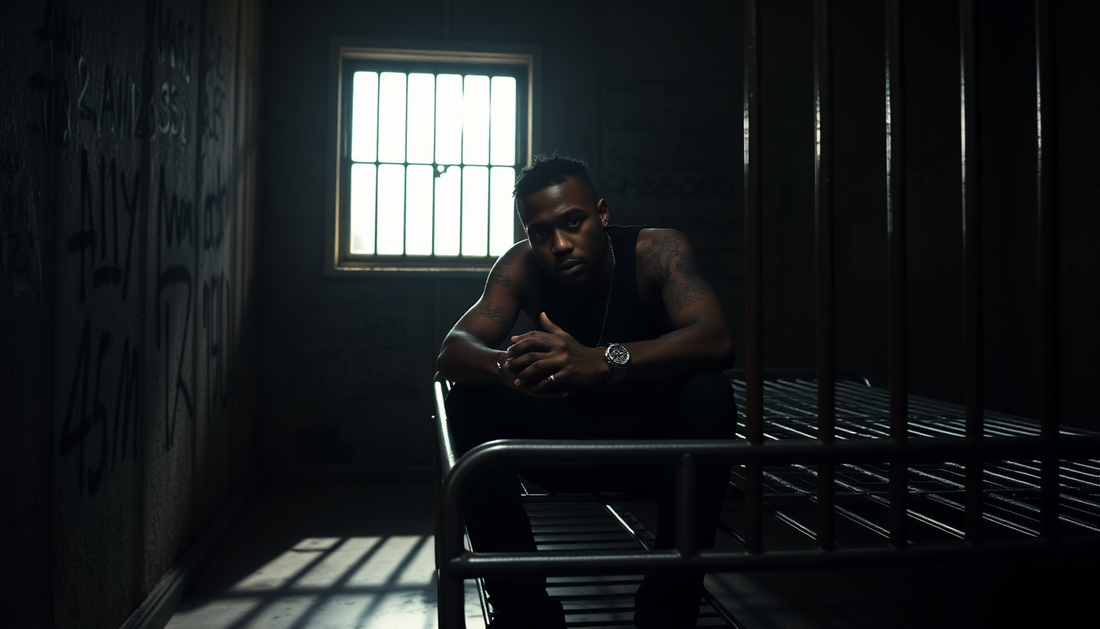
Rappers Behind Bars: The Sobering Realities of Crimes and Consequences
Share
In the vibrant world of hip-hop, where beats and rhymes captivate audiences worldwide, there's a sobering reality that often lurks beneath the surface – the incarceration of some of the genre's most prominent figures. From drug-related offenses to violent crimes, the intersection of rap music and the criminal justice system has become a subject of intense scrutiny and debate.
The Allure of the Hustle
For many aspiring rappers, the lure of the "hustle" – the pursuit of wealth, power, and status through unconventional means – can be a siren's call that's difficult to resist. The glamorized depiction of the street life, with its promises of fast money and instant gratification, has captivated the imaginations of countless young artists. However, the harsh realities of this lifestyle often come at a heavy price.
The Trap of the Trap House
The "trap house" – a term used to describe the illicit drug trade and the associated criminal activities – has become a recurring motif in the lyrics and narratives of many rappers. While some may view this as a reflection of their lived experiences, the glorification of these activities can have a profound impact on impressionable fans, particularly young listeners.
The Consequences of Crossing the Line
When rappers cross the line from artistic expression to criminal behavior, the consequences can be severe. High-profile cases, such as the incarceration of Tekashi 6ix9ine, Lil Wayne, and Kodak Black, have shone a spotlight on the harsh realities that some artists face when their actions land them behind bars.
The Toll on Careers and Legacies
The incarceration of rappers can have a devastating impact on their careers and legacies. The time spent in prison can interrupt the momentum of their musical endeavors, leading to missed opportunities and a potential loss of relevance in the ever-evolving landscape of hip-hop. Additionally, the stigma associated with criminal convictions can make it challenging for these artists to rebuild their careers upon release.
The Societal Implications
The intersection of rap music and criminal behavior extends beyond the individual artists involved. It raises broader questions about the societal factors that contribute to this phenomenon, as well as the role of the music industry in addressing these issues.
The Systemic Challenges
Many rappers come from underprivileged communities, where limited economic opportunities and systemic inequalities can push individuals towards illicit activities as a means of survival or social mobility. Addressing these underlying societal challenges is crucial in breaking the cycle of crime and incarceration within the rap community.
The Responsibility of the Music Industry
The music industry, with its immense influence and reach, has a responsibility to address the complex issues surrounding the incarceration of rappers. This may involve initiatives that promote positive role models, provide resources for at-risk youth, and foster a more ethical and socially conscious approach to the business of music.
The Path Forward
As the rap community grapples with the sobering realities of crimes and consequences, there is a glimmer of hope in the stories of those who have managed to turn their lives around. These redemption narratives serve as a reminder that even the darkest of circumstances can be overcome with determination, resilience, and a commitment to positive change.
Redemption and Rehabilitation
Rappers like Meek Mill, who have navigated the challenges of the criminal justice system and emerged as advocates for reform, offer a glimpse of the transformative power of rehabilitation and second chances. Their stories inspire hope and demonstrate the potential for artists to use their platforms to drive meaningful social change.
In the end, the incarceration of rappers is a complex issue that requires a multifaceted approach – one that addresses the underlying societal challenges, promotes accountability and responsibility within the music industry, and ultimately, fosters a culture of redemption and rehabilitation. By confronting these realities head-on, the rap community can pave the way for a future where the power of music is harnessed to uplift and inspire, rather than to perpetuate the cycle of crime and punishment.
